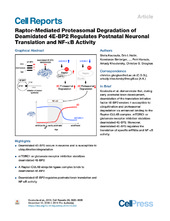Raptor-Mediated Proteasomal Degradation of Deamidated 4E-BP2 Regulates Postnatal Neuronal Translation and NF-κB Activity
Kouloulia, Stella; Hallin, Erik Ingmar; Simbriger, Konstanze; Amorim, Ines S; Lach, Gilliard; Amvrosiadis, Theoklitos; Chalkiadaki, Kleanthi; Kampaite, Agniete; Truong, Vinh Tai; Hooshmandi, Mehdi; Jafarnejad, Seyed Mehdi; Skehel, Paul; Kursula, Petri; Khoutorsky, Arkady; Gkogkas, Christos
Peer reviewed, Journal article
Published version

Åpne
Permanent lenke
https://hdl.handle.net/1956/23473Utgivelsesdato
2019Metadata
Vis full innførselSamlinger
Originalversjon
https://doi.org/10.1016/j.celrep.2019.11.023Sammendrag
The translation initiation repressor 4E-BP2 is deamidated in the brain on asparagines N99/N102 during early postnatal brain development. This post-translational modification enhances 4E-BP2 association with Raptor, a central component of mTORC1 and alters the kinetics of excitatory synaptic transmission. We show that 4E-BP2 deamidation is neuron specific, occurs in the human brain, and changes 4E-BP2 subcellular localization, but not its disordered structure state. We demonstrate that deamidated 4E-BP2 is ubiquitinated more and degrades faster than the unmodified protein. We find that enhanced deamidated 4E-BP2 degradation is dependent on Raptor binding, concomitant with increased association with a Raptor-CUL4B E3 ubiquitin ligase complex. Deamidated 4E-BP2 stability is promoted by inhibiting mTORC1 or glutamate receptors. We further demonstrate that deamidated 4E-BP2 regulates the translation of a distinct pool of mRNAs linked to cerebral development, mitochondria, and NF-κB activity, and thus may be crucial for postnatal brain development in neurodevelopmental disorders, such as ASD.
